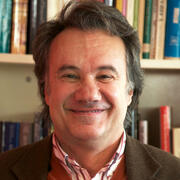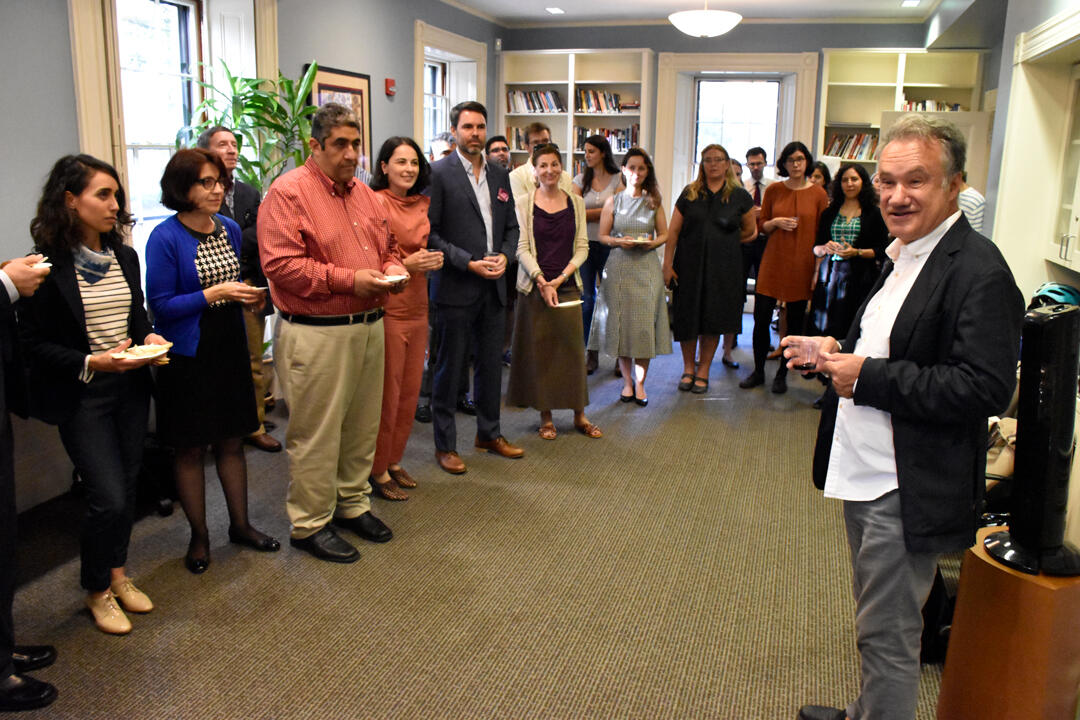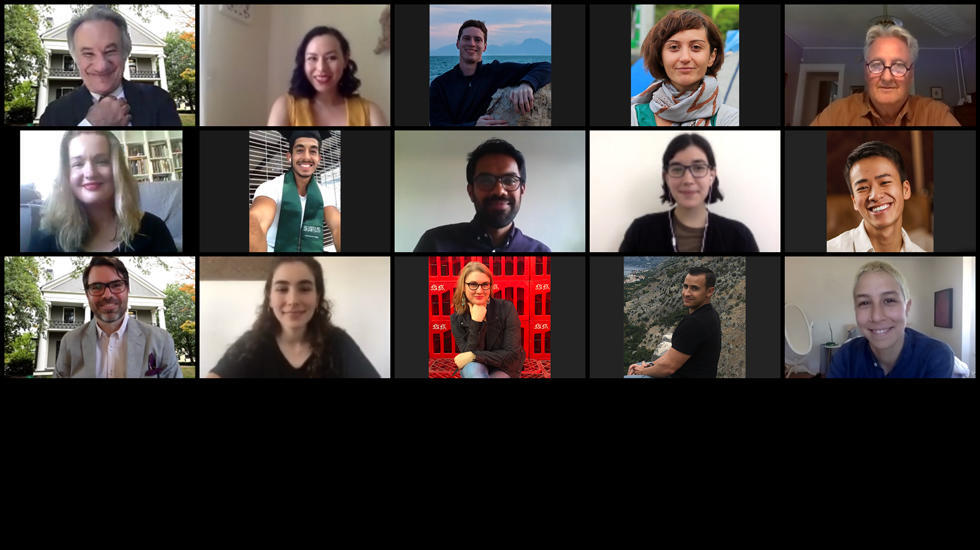
The original script made it look easy. I was going to be Acting Director for a year, while Bill Granara would enjoy his hard-earned sabbatical leave. The first eight months were indeed smooth, thanks above all to our administrative staff, working with great professionalism and efficiency under (to me) Lady Lauren Montague. Speaking of our staff colleagues, the Fall opened with the felicitous news that Carol Ann Young had given birth to Olive, whose visits to the center were the most cheerful moments of the semester—no contest.
In September, the book I co-edited with Gülru Necipoğlu and Cornell Fleischer, of the University of Chicago, arrived from Leiden in a handsome set of two volumes. Treasures of Knowledge: An Inventory of the Ottoman Palace Library (1502/3 – 1503/4) is the product of a group project launched in 2014 with a workshop at Harvard, to offer a detailed analysis of the library collection of the Topkapı Palace through its inventory from 1502 to 1504, listing more than seven thousand titles in different disciplines. The twenty-two essays on the intellectual life of the empire include those of Harvard colleagues Khaled El-Rouayheb, Mohsen Goudarzi, Himmet Taşkömür, and CMES alumni Aleksandar Shopov and Hüseyin Yilmaz, with contributions by Hesna Ergun Taşkömür and CMES students Didar Akbulut and Eda Özel.

In recognition of her “outstanding contributions to subjects within the humanities and social sciences,” Gülru Necipoğlu was named Corresponding Fellow of the British Academy. Her cohort includes another dear CMES friend and former faculty who is now in the other Cambridge, namely Khaled Fahmy. Kudos to them both!
Bill Granara’s new book, Narrating Muslim Sicily: War and Peace in the Medieval Mediterranean World, was the true delicacy of fall 2019. Why should I be embarrassed to promote it? Gülru and I took it along on our journey to Sicily in December, and it turned out to be a fabulous travel companion.
It was a great joy to have my first full year of colleagueship with Rosie Bsheer at the Center and to see her take charge of her teaching and advising responsibilities with such poise and generosity. We sorely needed a modern Middle East historian, and we lucked out by having Rosie in that role. The public lecture series that she organized, inviting authors of some exciting new books in Middle East studies, was an intellectual feast, well attended by engaged audiences. (Spoiler alert: the field will be blessed with an accomplished and stunningly original new book this fall, namely Rosie’s own volume on Saudi Arabia.)
Working with Jesse Howell, CMES’s Academic Programs Manager, was another first-full-year colleagueship pleasure. Not only did he and I and Lauren collaborate and conspire regularly, but he and I also co-ordinated the proseminar for our superb cohort of first-semester AM students, who gave an engaging and entertaining hard time to different CMES faculty members and guests each week.
I experimented with something new in terms of my own seminars, and that was the highlight of the year for me as a history teacher. No, make that the highlight of several years. Beshara Doumani, a colleague at Brown University, and I structured a seminar around a set of recent books in early modern and modern Middle East history, alternating the venue for each week’s session between Cambridge and Providence. We provided the syllabus and led the discussion, but it was the brilliant Middle East history students (from both Brown and Harvard) who provided the intellectual vibrancy that became our weekly fix. CMES’s logistical support was essential in pulling this traveling circus off.
Our J-Term programs in Tunisia and Turkey went as usual, namely superbly, thanks to Sihem Lamine and Jesse Howell, respectively.
February opened the second semester nicely with two big events. Derek Penslar, who published his eagerly awaited book on Theodor Herzl that month, hosted Noam Shuster-Eliassi, a wizard comedian who knows how to turns matters of gravity into the stuff of hilarity with biting humor and daring. The room was packed, of course, and bursting with laughter. But the other big event had an audience flowing into the corridors, because colleagues and students from many different parts of the University came together to celebrate and discuss Bill’s book on Sicily. Engaged does not begin to describe the audience, carried by Bill’s passion about his subject.
We had a fabulous lineup planned for the rest of the spring: concerts (Ara and Onno Dinkjian, Ezgi Stump); film opening (Zeynep Dadak’s Invisible to the Eye, based on Eremya Kömürjian’s seventeenth-century account of Istanbul); a visit by a celebrated author (Kapka Kassabova); book launches (CMES alum Ayfer Karakaya-Stump; the Harvard team of our Treasures of Knowledge); distinguished lectures, and more.
And then came March 2020. I’d better be brief about it. My memory of those days is foggy on many details but vivid when it comes to the feeling of uncanniness that was growing by the hour, as news circulated about an unparalleled challenge that we were facing and unprecedented decisions that had to be made. It was the saddest moment in my thirty-five years as a teacher when I saw the faces of students during those few days when they were still around but had been told that the campus would need to be vacated. I remember running into a senior I know in the lobby of Widener Library. Were we still shaking hands? We certainly were not wearing masks yet. One could still take for granted an encounter with a warm human touch in that sumptuous setting. I asked him how he felt, and he told me that he was “robbed of his senior year experience that he had been looking forward to for four years.” Neither he nor I doubted the wisdom of the University’s decision, but we could not clear the heavy air of the feeling of loss that the circumstances dished up.
We were all robbed of the spring 2020 experience. Online teaching was odd but not too bad, and in fact enjoyable in its own right at times. Given the absence of bodily travel, it also inspired us to invite a “commencement speaker” for our own graduating students for the first time. The award-winning author–intellectual Leila Slimani kindly agreed and dazzlingly delivered. But nothing, absolutely nothing, can replace the person-to-person face-to-face corporeal experience of a university, we all realized anew. The rest of the spring and summer, faculty and staff colleagues in the administration and on various committees worked tirelessly to articulate and keep refining new regulations regarding access to and mobility on campus.
Our developing fluency with Zoom allowed us to bring together our globally dispersed PhD students for a three-part workshop titled Research and Disruption. Students were able to share the challenges of conducting research abroad at a time when the pandemic (in tandem with historic floods in one case) caused closures of essential libraries and archives, disrupting all well-laid plans and research expectations. Seeing their committment and resourcefulness in the face of such obstacles was a jolt of energy for all of us .
The wait for the University’s decision regarding fall 2020 was suspenseful, to say the least, and by the time it was announced, the writ was on the wall.
As if the pandemic was not enough, there was another—dare I say, bigger—cataclysmic event to unfold. On May 23, first day of the Eid, I gave an interview to Medyascope, a Turkish web news channel, where we spoke about pandemics in the past and our current circumstance, simply thinking of coronavirus and the strange “normal” of the lockdown. At some point, I happened to mention that I had read about the fact that a far larger numbers of Black than White Americans were hit by the virus, and added that “the virus is working on the major fault-line of American society, the racial divide.” That much was and is obvious to anyone following the news. But how could any of us have known what May 25 would bring and lead to?
I need not go over the events since the tragic murder of George Floyd on that fateful day. We have posted a letter to our CMES community that is on our website.
And even that does not do it for a full account of the spring and summer. Having already acquired unmatched notoriety by the summer, the year 2020 also gave us the devastation in Beirut, where some dear members of our community, and an extended family of sorts, friends, friends of friends, former visitors, colleagues, students, happened to be witnesses to the tragedy and suffered the trauma. Words do not do much in these instances, but I know that each one of us, wherever we are, would like to express that we share their loss and their deep mourning and look forward to the revival of that glorious city of invincible citizens.
How I wish we had Roger with us for some bottomless conversations about all this.
Will you now think that I am being disingenuous if I say that there is also a lot to be cherished? But there is. Staying close to home, I am thinking, above all, of the remarkable resilience and perseverance of our community as well as the remarkable instances of solidarity that I have witnessed and heard about from so many.
Looking out beyond this Center of our own, I am cautiously but not skeptically encouraged and inspired by the response to all of the above in many corners of the world. I was born in 1954 and have lived my life in an age defined, not unambiguously or unequivocally I am afraid, by decolonization. This is one of the few moments in this age of decolonization when the decolonizing looks sharp and earnest in the very centers of colonialism. Never have I seen the critique of racism, colonialism, and ethnicity- and gender-based violence coalesce and speak to each other so sincerely and productively. At least in academia, I can attest to a sense of purpose and resolve to do things differently in a substantive manner rather than keep relying on statistical advances in inclusivity and diversity.
Maybe it is that September air that blesses us each year with a collective sense of rejuvenation, with the possibility of a beginning. A new semester is upon us. Having started my own sabbatical leave, and thousands of miles away from the campus, I can still feel the buzz, the energy, the optimism and determination no matter what.
This is a university, after all, and we believe in the power of education to make this a better world. That is our work, our vocation, our calling. May you all enjoy good health to continue to contribute to that noble mission.

